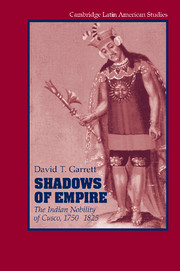Book contents
Conclusion
Published online by Cambridge University Press: 19 October 2009
Summary
For two and a half centuries, three fundamental aspects of Spanish rule in the Andes created and preserved a social space for an Indian elite. The establishment of the república de indios as a legal space placed the great majority of the indigenous population outside the domain of private Spaniards, and created the “pueblo de indios” as the physical manifestation of the Indian republic. Second, the co-option and reordering of Inca tribute as the basic material relationship between the crown and its Indian vassals, and the insistence that tribute be monetized, created a need for middlemen to negotiate the collection of tribute in labor and kind, and its conversion into specie. Finally, guided by a largely unchallenged belief in innate nobility and the natural justice of social hierarchy, the crown and its officials preserved and reworked the hierarchies of the Inca empire to produce a colonial Indian elite that oversaw both the local aspects of the tributary economy and the political life of the pueblo.
If the colonial order established in the late sixteenth century defined the relations and institutions of the Indian republic for two centuries, the indigenous societies of the Andes did not go unchanged during that period. Demographic collapse and internal migration variously destroyed, created, and reworked particular communities. The imposition of monogamy transformed the structure of kinship and household, especially among historically polygamous elites; it also reworked the relations between these elites and their communities. The introduction of private, alienable property also altered relations within the community: while differential control of resources had long marked the hierarchies of Andean society, private property and the emergence of a monetized market produced and perpetuated novel relations.
- Type
- Chapter
- Information
- Shadows of EmpireThe Indian Nobility of Cusco, 1750–1825, pp. 257 - 264Publisher: Cambridge University PressPrint publication year: 2005



